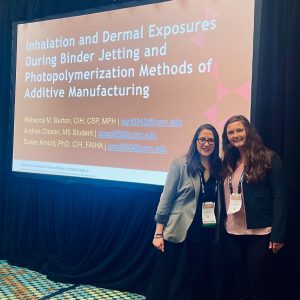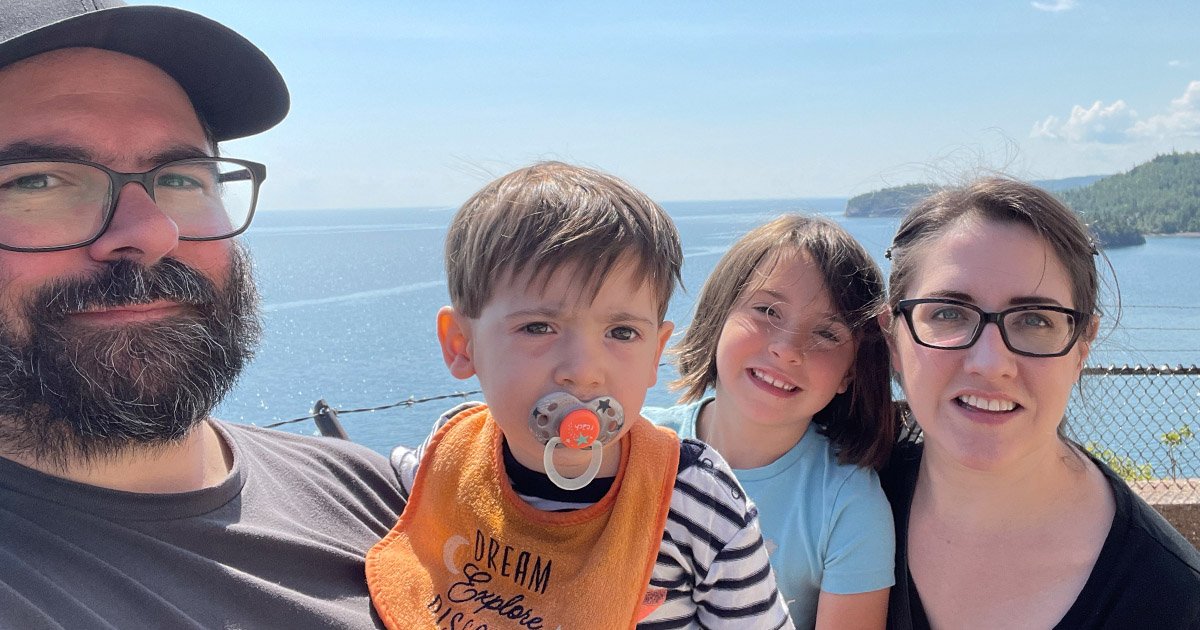I’m a fairly nontraditional student – I’m married, with two young children and a full-time job. For me, the most important thing about the program is being able to complete it a little bit at a time, at my own pace, in conjunction with my other responsibilities.
First, I’d like to know a little bit about you as a person. Where did you grow up? Where did you attend undergrad and what was your degree/area of study? [Rebecca] I grew up all over the place; my dad was in the Foreign Service. I was born in Texas, and lived in Maryland, Mexico, Bermuda, Nicaragua, and West Virginia before I even graduated high school. After high school, I attended Florida State University for undergrad, studying theatre technology and design. And then after I graduated, I continued to move a lot – I lived in upstate New York, Connecticut, Massachusetts, Iowa, and Delaware between 2004 and 2009, when I eventually moved to Minnesota. I’ve now lived in Minnesota longer than anywhere else.
What drew you to public health? OR How did you become interested in public health? OR What was that moment in your life when you decided you wanted to study public health?
[Rebecca] After I graduated from undergrad, I worked in professional theatre for the next ten years, mostly as a scenic painter but also occasionally doing stage props, carpentry, electrics, stage management, and stagehand work for a lot of different professional theaters. Over time, I realized what a huge amount of completely unsafe things were happening all around me. It didn’t matter what theater I was working at, they all had hazards. Just as one example: you find a lot of the same chemicals in the paint closet that you would in a chemistry lab, but in the theater there are no fume hoods. No one that I worked with had the organic chemistry training that would give them some hints that maybe these chemicals are not ones you really want to get up close and personal with. So, when some various life events made it a good time for a career change, I figured that occupational health was an area I could probably do some good in.
What specific issue, problem, or area of research in public health do you care the most about and why? [Rebecca] I started out in Occupational Hygiene because I wanted to help people in the arts create a work environment where they can create art that brings meaning to the world, without being at risk of injury or worse. While I am still very committed to that mission, I realized it’s broader than that. I have a basic, unshakeable belief that every person in this world has the fundamental right to earn a living, to support themselves and their families, without paying for it – whether that’s physical, mental, or spiritual health.
Are you currently involved in any public health research or professional work?
[Rebecca] I’m currently working full time as a global Industrial hygienist for Apple. Basically my job every day is working to keep our employees safe and healthy at their jobs. In addition, I’m working on my PhD in Environmental Health Sciences, with a focus on industrial hygiene to develop some new knowledge and to add to the field. My dissertation work focuses on characterizing occupational exposures for workers in additive manufacturing (3D printing).
Why did you choose to come to the U of M School of Public Health? 
[Rebecca] When I was looking to start my master’s degree, I knew the U of M was a school that had a great industrial hygiene program and it was in a city where my husband could also find a good job. I liked the faculty and the curriculum, and there were good career prospects in the area for after graduation. Then, when I decided to start my PhD, I was already established here, we had some children, and I already knew the program and faculty were great, and it simply made sense to stay put.
What are the reasons why you chose your program? What do you like about it?
[Rebecca] There wasn’t much chance of me choosing any other program. I wanted to do industrial hygiene from the start. I know many graduate students are looking around, trying out different aspects of the field, and looking for their area to specialize, but I’ve been pretty focused since the beginning. I knew I wanted to make safer workplaces for people, both through practice and research, and industrial/occupational hygiene is the most straightforward way to do that.
In what ways is the school a good fit for you?
[Rebecca] I’m a fairly nontraditional student – I’m married, with two young children and a full-time job. For me, the most important thing about the program is being able to complete it a little bit at a time, at my own pace, in conjunction with my other responsibilities. If I wasn’t able to have that flexibility in a program, I wouldn’t be able to pursue this degree. With that, the SPH faculty, and particularly my advisor Associate Professor Susan Arnold, have been really understanding and willing to work within a flexible framework to help me get through the program.That’s something I really appreciate. This program also has a great alumni network and other connections that have really helped me in my research and career advancement.

